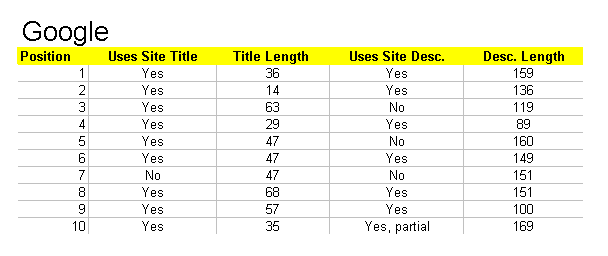
There's a lot more to securing first-place and first-page rankings, however, than links and personal connections. For that you'll need to delve into the mechanics of SEO and specifically the meta-data of your individual pages. We've analyzed the top listings and drawn some conclusions to help your website dominate the search results pages.
Meta-data was once the single-most important factor in placement (well, that and the type and quality of content on the page returned by the search engines), but no longer. Now meta-data has been deprecated in importance - but it's still important. Specifically, the title tag and description tag are key, and the best part is that it's completely under your control.
There are some general best practices as they relate to meta data. For example, it is imperative that each page feature unique (not replicated elsewhere) titles and descriptions. Another best practice is to write for readability and the optimal user experience - meaning it should be descriptive and appealing to users. Finally, since there is limited virtual "real estate" on search engines' results pages, the length of titles is limited (so we'll look at that too). Also worthy of note is that Google in particular does not always return the description that is available on the website, but often returns a content section from the page that most closely matches the users' specific query. That being said, there are times when the description is used - so we'll look at that as well.
These "best practices" are easier said than done, of course. But by looking at the search results pages periodically, and, more specifically, at the first-page results (and the first few listings), we can gain an idea of what's working - or at least what's most important to the search engines.
To conduct our test, we were logged out of the search engines as it should be obvious that the role that personalization plays today is far too influential in the modern search experience. With our setup in place, let's hit the SERPs - we'll look at Google and Bing independently.
Search Engine: Google
Keyword Phrase: Romantic Valentines Ideas
Some general thoughts on the sites in the top ten listings before venturing into the details. Overall, the design of about half the sites were in violation of Google's recent page layout algorithm. Personally, I found about half of the content below average (and, believe me, I need the help!).
That evaluation aside, just two of the sites were using the maximum allowable length for titles on Google. The average title length of the ten sites returned was 44 characters with spaces. Just one site on the search results page for this query did not have either the title or description provided on the site. The maximum description length on this query was 160 characters (with spaces) and the lowest was just 80 characters. The average description length was 138 characters.

Search Engine: Bing
Keyword Phrase: Romantic Valentines Ideas
In my opinion, Bing actually did a better job of providing a more universal search experience. The first listing was actually a section dedicated to news (one primary listing, two secondary listings - titles only), and had a section dedicated to related images. Also, unlike Google, Bing provided its related search area under the second organic listing. Finally, Bing featured an indication of the freshness of results with two that were indicated as published within the past one day.
Every listing on Bing used the title provided by the website listed. Just one of the ten sites returned (consequently, a Google Blogspot site) featured the exact description provided by the site. The average title length on Bing was 45 characters (with spaces) and the average description length was 136. Five listings used the maximum allowable description length, and just one listing used the maximum title length.
